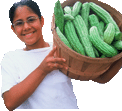Back to the Guide to Farming Table of Contents >>
Becoming Certified
Organic production offers many advantages for small farmers including ecologically friendly production methods, strong consumer demand for organic products, and higher prices. Regardless of if you use organic practices, if you have farm sales of more than $5,000/year you cannot legally sell your products as organic unless your farm has been officially certified.
If you sell less than $5,000/year of product and would like to use the word “organic” in your marketing, you must adhere to organic practices even though there is no certification process required. To learn more about this, download the PDF of Small Scale Organics from www.kerrcenter.com/publications/small-scale-organics.pdf
You can find the list of all certifying agencies by going to the USDA’s National Organic Program website: www.ams.usda.gov/AMSv1.0/ Click “National Organic Program” on the left. You can use any agency listed. The two located in New York are:
|
NOFA — New York, LLC 840 Upper Front St. Binghamton, NY 13905 607-724-9851 E-mail: www.nofany.org |
Natural Food Certifiers 648 Central Park Ave., Ste. 136 Scarsdale, NY 10583 845-426-5098 E-mail: www.nfccertification.com |
Fees and Costs
Certifying agencies generally charge a fixed fee to cover the initial certification costs and then an annual fee to cover the continued documentation and verification costs. Costs vary so you may want to investigate your certification options.
The NYS Department of Agriculture & Markets offers grants to new farmers to help cover the initial certification costs. They set aside a certain amount of money each year to cover 75% of the initial cost up to $500. This money is allocated on a first come first served basis.
For a grant application: Ag & Markets – 800-554-4501 or 518-457-2195; www.ams.usda.gov/nop – National Organic Program information; Forms can be downloaded from: www.agmkt.state.ny.us/AP/agservices/OrganicApp.pdf
General Overview of Regulations
Organic regulations are complex and ever-changing, which is why it is important to work with your certifying agency on everything that you do to assure compliance.
In general, you cannot use synthetic pesticides, antibiotics, or petroleum-based fertilizers. To certify a field as organic it must not have had pesticides or petroleum fertilizers applied for the past three years. To certify animals as organic, there are various transition requirements depending upon the animal species: dairy, beef, pork, poultry, etc.
Great attention is paid to nurturing the soil by the use of composts, cover crops, rock minerals and natural fertilizers. Plant disease and pests are controlled through the use of crop rotations, resistant varieties, cultivation, biological and botanical pest control. Animal health is maintained with wholesome food, adequate shelter, access to the outdoors, and preventive health plans.
Documentation of field maps, adjoining fields, complaints, crop inputs used, yields, sales, feeds purchased, medications used, and equipment-cleaning logs must be kept to maintain your certification.
This fact sheet is part of the Guide to Farming in NY by Monika Roth et al, published by the Cornell Small Farms Program and Cornell Cooperative Extension. Fact sheets are updated once annually, so information may have changed since last revision. If you are reading a printed version of a fact sheet, compare revision date with online fact sheet publish dates at https://nebeginningfarmers.org/publications/farming-guide to make sure you have the latest version.

 Information for beginning farmers.
Information for beginning farmers.

I need to know how to get signs for my farm that we have just begun growing as organic so that the conventional farmer next to me will stop spraying onto my property with his pesticides and other chemicals. can someone please tell me how i can get these signs I have seen on other organic farms? thank you Kim Lee
What state are you in, Kim? You may be able to get signs from whoever is certifying farms as organic in your state: if you google “USDA Certified Accrediting Agents” you’ll get to the Ag Marketing Service webpage where you can find someone local to you (I tried pasting in the link and it was ridiculously long)
What is your relationship like with this neighbor? We farmers, conventional and organic, are so few and far between that we really need to stick together whenever possible. If there is any way you could imagine approaching this neighbor respectfully and talking with them about spraying chemicals near your property, that approach may have more benefits for neighbor relations than simply putting up signs. You could even bring “peace offerings” of produce from your farm… but you may have already tried that. The other important thing for you to do, which is required anyway for organic certification, is to establish a buffer zone between your property and any conventional neighbors – I believe the width of the buffer depends somewhat on what’s happening around it, but it’s a good idea to plant shrubs or trees to help shield your property from chemical drift.
Hope this helps, and best of luck,
Erica